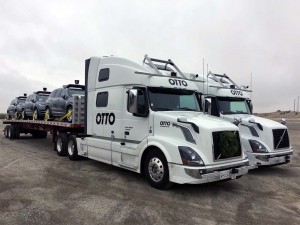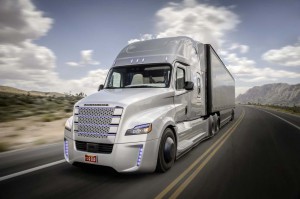
A pair of autonomous Otto trucks carrying prototype autonomous Volvos being tested by Uber. The Teamsters are watching autonomous laws carefully.
Tesla, Daimler, Uber and other companies are pushing ahead with the development of self-driving semi-trucks, but the International Brotherhood of Teamsters are determined to put up road blocks in an effort that could eventually eliminate the jobs of thousands of truck drivers and union members.
The Teamsters, which has 1.3 million members, has lobbied lawmakers to exclude commercial trucks from a bill that would allow more autonomous vehicles on the roads and limit the ability of individual states to regulate automated vehicles.
The union also praised Congress for recognizing that a starting point for any discussion on this subject was that no legislation should impact commercial motor vehicles or traditional commercial drivers.
“The wide range of issues that are inherent with vehicles used for commercial purposes warrants an entirely separate discussion and one that the Teamsters will be at the center of. Congress has wisely recognized that any such dialogue is entirely premature and must be done gradually, in the public view, and with the full engagement of all stakeholders,” Teamsters General President James P. Hoffa said in a statement.
(Tesla wants to test autonomous semi-truck in Nevada. For the story, Click Here.)
“It is vital that Congress ensure that any new technology is used to make transportation safer and more effective, not used to put workers at risk on the job or destroy livelihoods and chip away at the middle class,” Hoffa said.
The legislation is top of mind for many as Tesla announced recently its new battery-electric truck would be ready for testing in September. Most have known of the truck for some time, the company surprised many when it was revealed it had autonomous capability.
Tesla won’t be alone. Daimler’s Freightliner unit has been testing autonomous trucks in the U.S. and Germany for some time. Otto, which is now owned by Uber, sent an autonomous truck across Colorado to deliver beer last year.
(Click Here for details about the Teamsters efforts regarding autonomous trucks.)
The workers who make their livelihood in these industries should have an active role to play in shaping the future of their jobs and their industries, the union has opined for some time now. Hoffa also said Teamsters Union will continue working with lawmakers to improve the initial legislation that was recently passed out of the House Energy & Commerce Committee.
Congress is expected to tackle the first federal legislation on self-driving vehicles in September after it returns from summer recess. The bipartisan plan raises the cap on permitted vehicles that don’t have common features such as a steering wheel, or meet certain safety requirements, to 100,000 a year from the current limit of 2,500.
The union has lobbied against state legislation that would allow freight companies to use what is known as platooning technology. This digitally connects a group of trucks so they drive in a gas-saving formation. It is seen as a precursor to autonomous trucks, and Arkansas, Tennessee and South Carolina are among the states considering permitting these types of trucks for testing.
(To see more about Waymo moving into the autonomous truck sector, Click Here.)
In fact, Tesla is in discussions with transportation officials in Nevada and California about testing just such a truck in both states. Volvo also has a similar truck in development.

